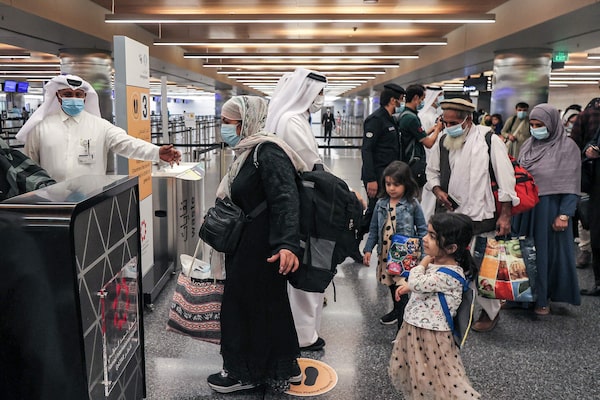
Evacuees from Afghanistan arrive at Hamad International Airport in Qatar's capital Doha on Sept. 10.KARIM JAAFAR/AFP/Getty Images
About 250 Afghan evacuees are now a step closer to resettlement in Canada, following a month-long journey to flee their country’s takeover by the Taliban.
For four weeks, amid the chaos of the last days of the war in Afghanistan, they had discreetly travelled hundreds of kilometres across the country before reaching Pakistan overland, thanks to visas arranged by a Toronto-based charity, Prince’s Trust Canada.
Most of them have crossed the border between Afghanistan and Pakistan in the past three days and are expected to begin a new life in Saskatoon this fall. A handful are already in Saskatchewan.
The group, made up mainly of members of the Hazara minority, includes young female students, singers and martial artists, people whom the Canadian government considers vulnerable under the strict Islamic edicts of Afghanistan’s new rulers.
The departure of this contingent of Hazaras is noteworthy because other organizations that have tried to organize evacuations for Afghans with connections to Canada have complained that they faced delays, confused directives and bureaucratic hurdles.
The Hazaras are Shiites and have a distinctive ethnic origin, making them targets for persecution by the Taliban, who practise a hard-line form of Sunni Islam.
Three-year-old Afghan boy reunited with his father in Toronto after two weeks alone in Qatar
Following the sudden collapse of Afghanistan’s pro-Western government, Canada airlifted about 3,700 Canadian nationals, former interpreters and their relatives out of Kabul. But thousands of others were stranded. Canada has committed to resettling about 21,000 Afghans.
“The last few weeks have been a roller coaster as we’ve sought to have these families get out of Afghanistan,” Mark Fell, Prince’s Trust Canada chairman, said in an interview Saturday.
Mr. Fell’s involvement began when he received a phone call from Britain on Aug. 21.
Prince’s Trust Canada is part of a network of charities set up by Prince Charles. The organization’s chief executive in London, Dame Martina Milburn, enlisted Mr. Fell to help an institution in Afghanistan that was trying to arrange for a group of Hazaras to leave the country. For security reasons, Mr. Fell didn’t identify the institution.
On Aug. 13, federal Immigration Minister Marco Mendicino announced that, in addition to fast-tracking the resettlement of Afghans who helped Canada’s military and diplomatic missions, Ottawa was creating a special program for groups vulnerable under the Taliban, such as female leaders and persecuted religious minorities.
Within a week, Mr. Fell was able to arrange visas to Canada for the group. The Hazaras were hoping to fly out of Kabul, and a small number managed to board a plane and make their way to Mexico and eventually, to Canada.
“I feel safe and I have a plan for my foreseeable future,” said an Afghan woman who was one of that handful and is now in quarantine in Saskatoon with her husband. The Globe and Mail is not revealing her identity because she still has family in Afghanistan.
She said she was a women’s rights activist and expressed relief that her circumstances now are “completely different from my situation 25 days ago in Afghanistan.”
However, back in Kabul, where the rest of this contingent of Hazaras was trying to get to the airport, the emergency airlift of evacuees ended abruptly with the departure of the last U.S. troops on Aug. 30.

Evacuees from Afghanistan arrive inside the terminal at Hamad International Airport in Qatar's capital, Doha, on the first flight carrying foreigners out of Kabul since the conclusion of the U.S. withdrawal last month.KARIM JAAFAR/AFP/Getty Images
In a feat of logistics, the Prince’s Trust and its contacts in Afghanistan were able to relocate the group to the northern city of Mazar-i-Sharif, where scores of others trying to leave Afghanistan had been waiting for international flights to resume.
This operation, co-ordinated between people in Canada, Britain, the United States and Afghanistan over the WhatsApp messaging service, involved transporting more than 200 people in small groups and keeping them out of sight from the Taliban in multiple safe houses.
The Hazaras were joined by a smaller group made up of workers of the Malala Fund, a non-profit co-founded by Malala Yousafzai, the Pakistani Nobel Peace Prize laureate. They also had Canadian visas.
When the flights out of Mazar-i-Sharif didn’t materialize, the group considered travelling to neighbouring Uzbekistan since the border crossing – a bridge over the Amu Darya river – was only an hour’s drive away. However, that border was closed.
On Sept. 10, Mr. Mendicino announced that Canada had been able to get some Afghan nationals through the border crossing with Pakistan, opening a land route for humanitarian resettlements.
The Hazaras then headed back south and were able to enter Pakistan on 30-day visas. They are now privately hosted in the capital, Islamabad. They are expected to be processed and flown to Canada in the coming weeks.
Their resettlement in Saskatoon is supported by the federal government. The handful of evacuees who have already arrived are now in quarantine, as required by Ottawa under its pandemic-control measures.
As for the bulk of the group, “we see them now as being safe in Pakistan and having a wonderful future ahead of them in Canada,” Mr. Fell said.
“Bringing this young Afghan community to Canada will help make Saskatoon, and even Canada, thrive.”
As of Sept. 12, according to Immigration, Refugees and Citizenship Canada, 12,400 applications have been received under the program to resettle vulnerable Afghans and 8,200 were approved. So far, 2,200 new Afghan refugees have reached Canada.
Our Morning Update and Evening Update newsletters are written by Globe editors, giving you a concise summary of the day’s most important headlines. Sign up today.
 Tu Thanh Ha
Tu Thanh Ha